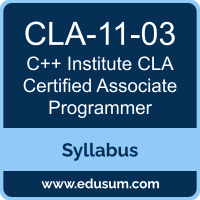 Use this quick start guide to collect all the information about C++ Institute CLA Certified Associate Programmer (CLA-11-03) Certification exam. This study guide provides a list of objectives and resources that will help you prepare for items on the CLA-11-03 C++ Institute CLA - C Certified Associate Programmer exam. The Sample Questions will help you identify the type and difficulty level of the questions and the Practice Exams will make you familiar with the format and environment of an exam. You should refer this guide carefully before attempting your actual C++ Institute CLA - C certification exam.
Use this quick start guide to collect all the information about C++ Institute CLA Certified Associate Programmer (CLA-11-03) Certification exam. This study guide provides a list of objectives and resources that will help you prepare for items on the CLA-11-03 C++ Institute CLA - C Certified Associate Programmer exam. The Sample Questions will help you identify the type and difficulty level of the questions and the Practice Exams will make you familiar with the format and environment of an exam. You should refer this guide carefully before attempting your actual C++ Institute CLA - C certification exam.
The C++ Institute CLA Certified Associate Programmer certification is mainly targeted to those candidates who want to build their career in C Programming domain. The CLA - C Certified Associate Programmer exam verifies that the candidate possesses the fundamental knowledge and proven skills in the area of C++ Institute CLA - C.
C++ Institute CLA Certified Associate Programmer Exam Summary:
| Exam Name | CLA - C Certified Associate Programmer |
| Exam Code | CLA-11-03 |
| Exam Price | $295 (USD) |
| Duration | 65 mins |
| Number of Questions | 55 |
| Passing Score | 70% |
| Books / Training |
C Essentials 1 (Basics) (Edube, self-enroll/self-study) C Essentials 2 - (Intermediate) (Edube, self-enroll/self-study) |
| Schedule Exam | Pearson VUE |
| Sample Questions | C++ Institute CLA Certified Associate Programmer Sample Questions |
| Practice Exam | C++ Institute CLA-11-03 Certification Practice Exam |
C++ Institute CLA-11-03 Exam Syllabus Topics:
| Topic | Details |
|---|---|
| Absolute basics |
- languages: natural and artificial, - machine languages, - high-level programming languages, - obtaining the machine code: compilation process, - writing simple programs, - variables, - integer values in real life and in C, - integer literals. |
| Data Types |
- floating point values in real life and in C, - float literals, - arithmetic operators, - priority and binding, - post- and pre-incrementation and decrementation, - operators of type op=, - char type and ASCII code, - char literals, - equivalence of int and char data, - comparison operators, - conditional execution and if keyword, - printf() and scanf() functions. |
| Flow control |
- conditional execution: the “else” branch, - integer and float types, - conversions, - typecast and its operators, - loops – while, do and for, - controlling the loop execution – break and continue, - logical and bitwise operators. |
| Arrays |
- switch: different faces of ‘if’, - arrays (vectors), - sorting in real life and in a computer memory, - initiators, - pointers, - an address, a reference, a dereference and the sizeof operator, - simple pointer and pointer to nothing (NULL), - & operator, - pointers arithmetic, - pointers vs. arrays: different forms of the same phenomenon, - using strings, - basic functions dedicated to string manipulation. |
| Memory management and structures |
- array indexing, - the usage of pointers: perils and disadvantages, - void type, - arrays of arrays and multidimensional arrays, - memory allocation and deallocation: malloc() and free() functions, - arrays of pointers vs. multidimensional arrays, - structures, - declaring, using and initializing structures, - pointers to structures and arrays of structures, - basics of recursive data collections. |
| Functions |
- functions, - how to declare, define and invoke a function, - variables’ scope, local variables and function parameters, - pointers, arrays and structures as function parameters, - function result and return statement, - void as a parameter, pointer and result, - parameterizing the main function, - external function and the extern declarator, - header files and their role. |
| Files and streams |
- files vs. streams, - header files needed for stream operations, - FILE structure, - opening and closing a stream, open modes, errno variable, - reading and writing to/from a stream, - predefined streams: stdin, stdout and stderr, - stream manipulation: fgetc(), fputc(), fgets() and fputs() functions, - raw input/output: fread() and fwrite() functions. |
| Preprocessor and complex declarations |
- preprocessor, - #include: how to make use of a header file, - #define: simple and parameterized macros, - #undef directive, - predefined preprocessor symbols, - macrooperators: # and ##, - conditional compilation: #if and #ifdef directives, - avoiding multiple compilations of the same header files, - scopes of declarations, storage classes, - user –defined types, - pointers to functions, - analyzing and creating complex declarations. |
To ensure success in C++ Institute CLA - C certification exam, we recommend authorized training course, practice test and hands-on experience to prepare for C++ Institute CLA - C Certified Associate Programmer (CLA-11-03) exam.
